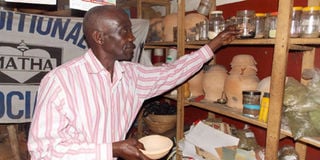Rakai traditional healers tasked to register clients

Organised. Mr Salongo Kayinga Kiggundu, the chairperson of traditional healers in Masaka District, arranges the bottles of herbs in the shelves inside his work place in Masaka Town in December 2018. PHOTO BY MICHAEL J SSALI
What you need to know:
- In 2017, leaders of traditional healers under Masaka District Traditional Healers’ Association attempted to register their members, but the exercise flopped because many lacked permanent addresses.
Authorities in Rakai District have ordered traditional healers and herbalists to register their clients as a way of bolstering security in the area.
In an interview on Wednesday, Mr Ben Nuwamanya, the Rakai District Police Commander, said different people, including criminals, approach traditional healers in their shrines on a daily basis, but they fail to trace them when they engage in criminal acts.
Traditional healers have for a long time been blamed for the recurring cases of child sacrifice and other ritual murders, while some have been accused of raping women.
There are reports that traditional healers use remains of the dead.
However, this cannot be elaborately explained by practitioners nor proved scientifically.
Mr Nuwamanya said all traditional healers have to comply with this new directive and those who will not, will be charged with obstructing police work.
“When we go to their shrines during our investigations, they [traditional healers] must make sure they collaborate with our detectives by giving them important information we need,” he said.
However, Ms Justine Nansamba, the chairperson Greater Masaka Traditional Healers Association, blamed police for always revealing the source of information during investigations which exposes their members to danger.
She said registering their clients will be an infringement on their privacy.
Mr Joseph Ssendagi, the Rakai District probations officer, said ritual sacrifice in Rakai can only be stopped if traditional healers in the area collaborate well with authorities.
An estimated 20,000 traditional healers are said to be operating in the nine districts of Greater Masaka.
Background
In 2017, leaders of traditional healers under Masaka District Traditional Healers’ Association attempted to register their members, but the exercise flopped because many lacked permanent addresses.



